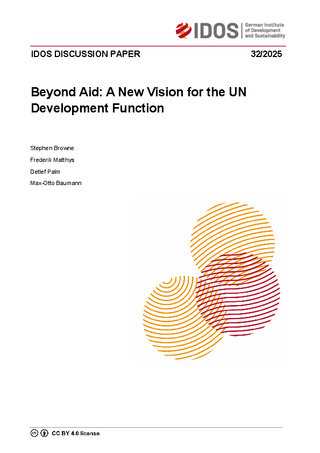Beyond aid: a new vision for the UN development function
Browne, Stephen / Frederik Matthys / Detlef Palm / Max-Otto BaumannDiscussion Paper (32/2025)
Bonn: German Institute of Development and Sustainability (IDOS)
ISBN: 978-3-96021-277-5
DOI: https://doi.org/10.23661/idp32.2025
This discussion paper advances a new vision for the United Nations (UN)’s development function at a moment when the organisation is facing profound pressures and persistent scepticism about its relevance. Although a consensus exists that reform is overdue, past initiatives have been too incremental, focusing on coordination and efficiency without addressing deeper institutional and political pathologies. The result is a UN development system that has grown financially large but is losing political significance. It is increasingly shaped by donor earmarking, entrenched patronage and a project delivery model that bears little resemblance to how national development actually occurs.
Our vision marks a significant departure from the UN’s historical role as an aid channel predicated on the North-South divide. Instead, the UN’s future relevance lies in leveraging its universal legitimacy, normative authority and convening power.
We argue for a UN development system that:
1. Acts as a trusted knowledge facilitator: providing high-level and technical advice, supporting peer exchange and helping governments navigate complex policy trade-offs in ways that are independent, politically informed and normatively grounded.
2. Engages in public advocacy that matters: elevating norms, correcting misinformation and shaping national debates in line with globally agreed standards, with sensitivity to national contexts.
3. Applies universality in practice: moving beyond the outdated distinction between donor and recipient to engage with all member states – including middle- and high-income countries – through global monitoring and peer accountability.
4. Serves as an actor of last resort in fragile settings: providing operational support only where national governments cannot or will not act, with strict sunset clauses and safeguards against unintentional harm.
This reconceptualisation is not primarily about money. It implies a financially smaller but politically stronger UN development system that is less dependent on donors and more relevant to today’s multipolar world. The real benchmark for success is not the volume of aid provided but the quality of advice, advocacy and resulting cooperation.
Reaching this vision will be difficult. The UN’s development apparatus is shaped by vested interests, path dependency and political inertia. Yet, opportunities for change exist. The collapse of traditional aid financing, the insistence of middle-income countries on equitable partnerships and fatigue with the current project-heavy model all point towards the need for a new approach. The Secretary-General’s UN80 Initiative offers a platform for bold ideas, but only if the debate moves beyond technical fixes and acknowledges the political trade-offs inherent in transformation.
Stephen Browne is a visiting lecturer at universities in the UK, Switzerland and India. He spent more than 30 years in the UN development system and has published many books and articles on the UN and foreign assistance.
Frederik Matthys is Senior Advisor at Tomorrow Is Possible with a focus on sustainable development, international cooperation and multilateral reform.
Detlef Palm worked for UNICEF for 30 years in country offices and at headquarters. He served as the focal point for programme policy, an auditor and a representative.


